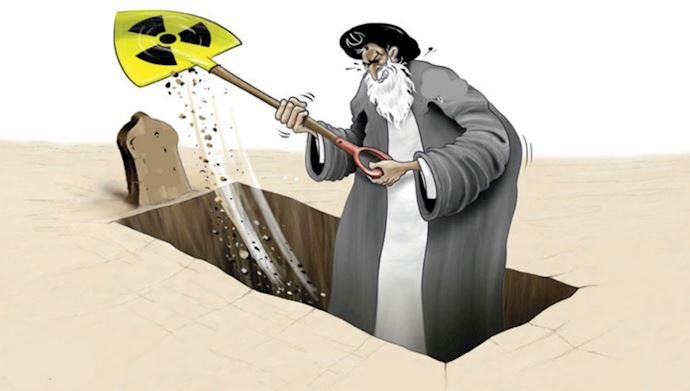Analysis by PMOI/MEK
Iran, October 6, 2019—Last Wednesday, Iranian regime Supreme Leader Ali Khamenei said that the country will continue to reduce its commitments to the 2015 Joint Comprehensive Plan of Action (JCPOA), formally known as the Iran nuclear deal.
Speaking to a gathering of Islamic Revolutionary Guard Corps (IRGC) senior commanders on October 2, following a three-day IRGC session, Khamenei ominously called on them to prepare for “big events,” while advising “to be more active in the economy, culture and ideology.”
While Khamenei was trying to maintain the morale of his IRGC commanders, Iranian regime President Hassan Rouhani attended a cabinet meeting and talked about his efforts and the Islamic Republic’s lobbies in New York to launch negotiations with the U.S.
Apparently, Rouhani also felt the need to pump hope and optimism, considering the gloomy prospects for their regime.
“… the road is not over, the path is not blocked, Europeans are still trying, others are also trying… the road is not blocked, it’s still open,” Rouhani said.
“In our path, the road is open. We will continue. It’s not a dead-end! I think that the road is open. I think that the whole world has come to the conclusion that it was wrong for the U.S. to exit the JCPOA. The U.S. won’t succeed. Everybody has come to the conclusion that the JCPOA has been the best possible agreement in its time. Everybody has come to the conclusion that they need to talk with Iran,” he added, sounding very much like the wishful thinking of a gambler on the brink of total bankruptcy.
The state-run Entekhab website writes about how Russian President Vladimir Putin recently met Rouhani: “While mentioning the French president’s failed attempts to forge a meeting between Rouhani and U.S. President Donald Trump on the sidelines of United Nations General Assembly in New York, Putin assessed that Iran is willing to return its relations with the U.S. to its state before the tensions and somehow normalize.”
This willingness to negotiate with the U.S. has become an imminent necessity inside the Iranian regime’s different political circles.
Ebrahim Rasaghi, an Iranian economist close to Khamenei’s faction, refers to the economic crises, budget deficit and 43 percent inflation, and describes the Iranian government’s claims that economic difficulties have been contained as “bluffs,” adding that the government is only seeking “the silver lining of negotiations.”
The Entekhab website quotes Ali Bighdeli, an Iranian political pundit close to Rouhani’s faction, questioning the strategy of decreasing Iran’s obligations under the JCPOA.
“Now, we need to ask what is the goal of decreasing Iran’s obligations under the JCPOA and why are they taken? Unfortunately, the government has no clear answer to this question. The fact is that if the next steps are taken recklessly, it is possible that Iran’s dossier is referred to the United Nations Security Council, rendering a resumption of international sanctions. Therefore, I advise the government to act more cautiously in taking its next steps. We should ask ourselves where we intend to get and what goal we are pursuing? This issue is very important.”
Kuroush Ahmadi, a former Iranian diplomat, highlights the dangerous international situations the Iranian regime faces. “The time of playing a double game in foreign policy is over,” he said.
“The most important question is whether incidents like the attack on Saudi Arabia’s Aramco oil facilities will continue or not? And if they continue, will Trump still avoid entering a war or not? In such circumstances, another important question is whether Europe will, in the next few months, continue its current negative approach, which also accelerated under the impact of the attack against Aramco’s facilities, and whether it will lead to Europe exiting the JCPOA?” he further asked.
Read more:
The Iranian opposition coalition National Council of Resistance of Iran (NCRI) held a press conference on September 30 citing information obtained from inside the Iranian regime detailing Tehran’s involvement in the September 14 attacks targeting Saudi Arabia’s Aramco oil facility.
The NCRI emphasized in a report that Iranian regime Supreme Leader Ali Khamenei, with the mullahs’ President Hassan Rouhani and Foreign Minister Mohammad Javid Zarif present, issued the order on July 31 to attack the Saudi oil facility.
The People's Mojahedin Organization of Iran (PMOI/MEK), the main group member of the NCRI, has confirmed the information's validity, saying it was obtained through informants within the ’s Revolutionary Guards (IRGC) and the regime apparatus.





